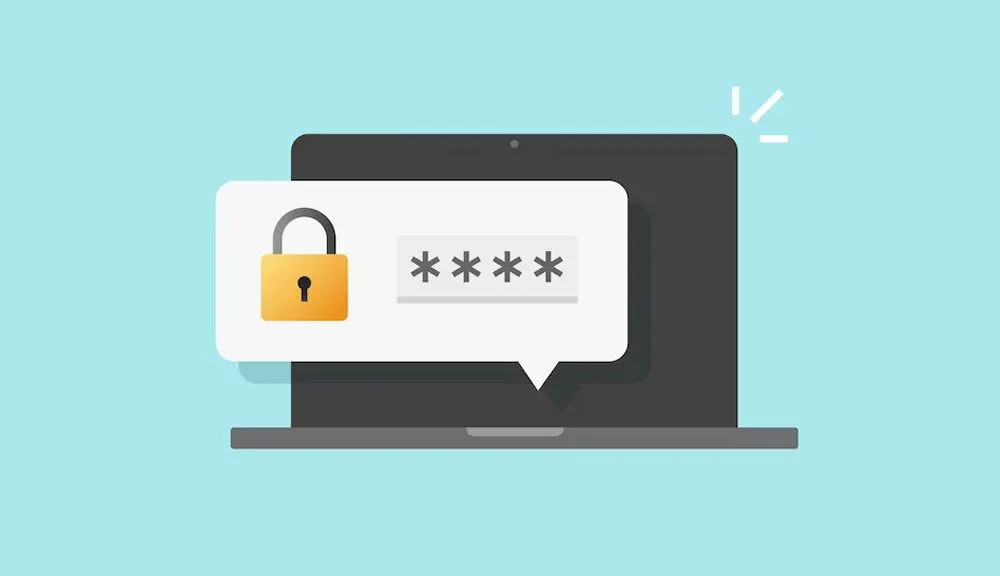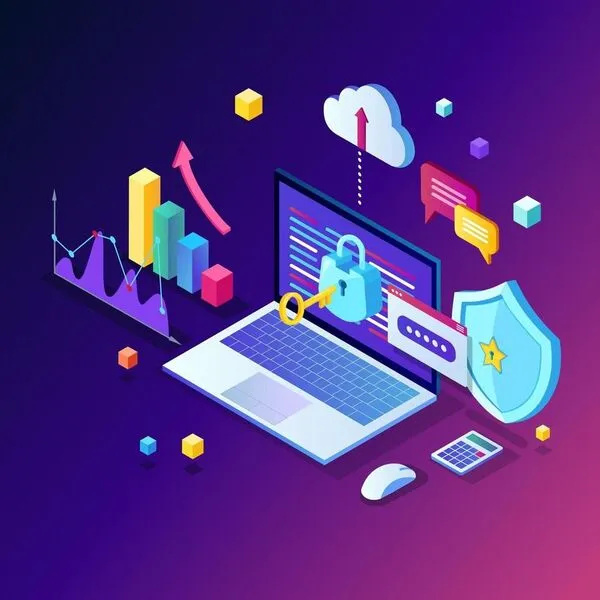8 Best Antivirus Software Options to Keep Your Devices Safe in 2025
May 22, 2025

Malware doesn’t knock first, it just walks in if your system isn’t protected. And in 2025, the threats aren't slowing down. From phishing links in emails to spyware tucked into sketchy downloads, your devices are exposed every time you go online. That’s why choosing the best antivirus software is no longer optional. It is basic digital hygiene.
This isn’t about tossing any old scanner on your desktop and hoping for the best. The top antivirus programs today do more than block viruses. They monitor real-time activity, flag suspicious behavior, and provide ransomware protection, phishing defense, and firewall integration. Many of them also bundle features like encrypted storage or even password manager tools to protect your logins and identity across platforms.
Whether you’re using a high-performance gaming PC, a MacBook for creative work, or an Android device on the go, there’s a tailored solution that balances speed, security, and usability. In this guide, we’ll break down the top antivirus software for 2025, including free picks, lightweight options, and all-in-one security suites that do it all.
Before we dive into individual programs, let’s take a closer look at why antivirus is still one of the most important layers in your digital security stack.
Table of Contents
- Why Antivirus Software Still Matters
- Best Overall Antivirus Software
- Best Free Antivirus Software
- Best Antivirus for Windows
- Best Antivirus for Mac Users
- Best Antivirus for Android Devices
- Best Lightweight Antivirus
- Best Antivirus for Gamers
- Best Antivirus with VPN
- What to Look for When Choosing Antivirus Software
- FAQs About Antivirus Software
- Choosing the Best Antivirus Software for Your Needs
Why Antivirus Software Still Matters

Antivirus software has come a long way from the days of clunky scans and endless pop-ups. Today, it’s not just about chasing viruses, it’s about stopping ransomware attacks, blocking spyware, and keeping your personal data from leaking through your browser or inbox. If you’re connected to the internet, you're a potential target. That includes phones, laptops, and even smart home devices.
New Threats Demand More Than Just a Firewall
A firewall is a great first line of defense, but it only filters what comes in and out of your network. What happens when malicious code hides inside a seemingly normal file? Or when you unknowingly click a fake login page that steals your credentials? That’s where the best antivirus software fills the gap: scanning in real time, flagging suspicious activity, and shutting down threats before they spread.
Malware doesn’t always show up as a red flag. Some of the most dangerous types like keyloggers or trojans run quietly in the background, tracking your activity or feeding data to someone else. A quality antivirus solution doesn’t just find these, it actively prevents them from embedding in your system in the first place.
The Role of Antivirus in Everyday Security
It’s not just about your system; it’s about your identity. Many modern antivirus suites now include features that used to require separate tools: VPNs, secure browsers, breach monitoring, and yes, even password managers that alert you when your logins are compromised or reused.
If you're managing sensitive work files, storing financial documents, or simply logging into multiple sites daily, antivirus software becomes your digital bouncer. It doesn’t sleep, it doesn’t forget, and when configured properly, it makes sure you don’t either.
Best Overall Antivirus Software
If you want a security solution that checks every box, strong malware protection, fast performance, multi-platform support, and useful features that actually matter. There’s one name that consistently leads the pack. It’s not the flashiest, but it gets the job done across the board.
Bitdefender Total Security
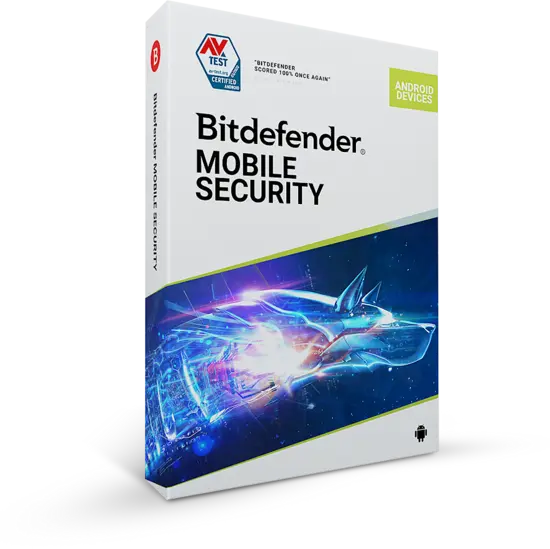
Bitdefender Total Security delivers a security suite that’s more than just antivirus, it’s a complete digital defense system. It runs smooth in the background without hogging system resources, and its malware detection consistently scores at the top in third-party lab tests. That means fewer pop-ups and more peace of mind whether you're browsing, downloading, or working online.
What makes Bitdefender stand out is how much it bundles into one subscription. You get real-time threat monitoring, ransomware remediation, a built-in VPN (with a daily limit on the basic plan), a secure browser for online shopping, and a simple but effective password manager. And if you’re juggling multiple devices, you’ll appreciate that it works on Windows, macOS, Android, and iOS with a unified dashboard to control them all.
Updates run silently, the UI is clean, and the customization settings let you fine-tune your level of protection without getting overwhelmed.
Best For:
- Users who want an all-in-one antivirus with low system impact
- Households with mixed devices (PCs, Macs, phones, tablets)
- Anyone who wants extras like a VPN, parental controls, and password storage without needing separate apps
Best Free Antivirus Software
You don’t always have to pay to stay protected. While premium suites offer more tools and flexibility, there are still free antivirus programs that give you reliable core protection without burying your system in ads or limiting essential features.
Avast Free Antivirus

Avast Free Antivirus is a go-to for users who want basic protection with minimal effort. It’s light on system resources, easy to install, and covers all the essentials: real-time threat detection, behavior monitoring, and automatic updates. You also get access to Avast’s Wi-Fi inspector, which checks for vulnerabilities in your home network a nice touch if you’re using smart home devices.
Avast’s malware scanner regularly scores high in independent lab tests, and its interface is clean and beginner-friendly. Yes, there are prompts to upgrade to the paid version, but they’re not overly aggressive. The free version still gives you solid antivirus coverage without requiring your credit card.
You won’t find extras like a VPN or full-on password manager, but for casual users, this free tool is more than enough to keep everyday threats in check.
Best For:
- Students, casual users, or anyone looking for no-cost protection
- Older computers or laptops that need a light antivirus
- Basic scanning, email protection, and real-time alerts without feature overload
Best Antivirus for Windows
Windows continues to be the most targeted operating system when it comes to malware and ransomware. Built-in protection like Windows Defender is decent for casual users, but if you're handling sensitive data, gaming online, or using your device for work, upgrading to a more advanced solution adds serious value.
Norton 360 Deluxe
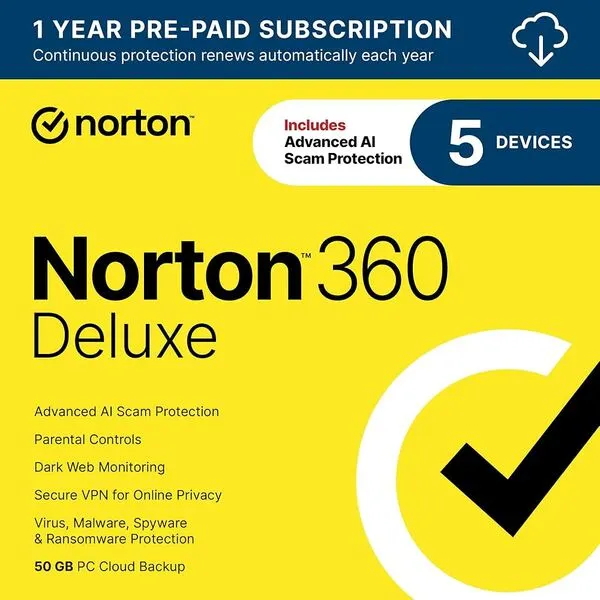
Norton 360 Deluxe is built with Windows users in mind, offering layered protection that goes well beyond simple virus scanning. It defends against malware, spyware, phishing attempts, and real-time exploit attacks. What really makes it stand out is how well it plays with the Windows ecosystem, it’s optimized for performance and won’t slow down boot times or interfere with background apps.
This version also bundles in dark web monitoring, cloud backup (10GB included), a secure password manager, and a full-featured VPN. It’s essentially a privacy suite wrapped in antivirus skin. The dashboard gives you quick access to key features, and the system health tools help keep your machine optimized in the background.
It’s a smart pick if you want something you can install once and trust to run without babysitting it every day.
Best For:
- Windows users who want full protection with system performance tools
- Remote workers handling personal or business data
- Anyone looking for bundled extras like backup, VPN, and identity monitoring
Best Antivirus for Mac Users
There’s a myth that Macs don’t get viruses. While macOS is more locked down than Windows, it’s not immune especially with phishing scams, adware, and cross-platform threats becoming more common. If you’re invested in the Apple ecosystem, you still need a layer of protection that understands how macOS works.
Intego Mac Premium Bundle
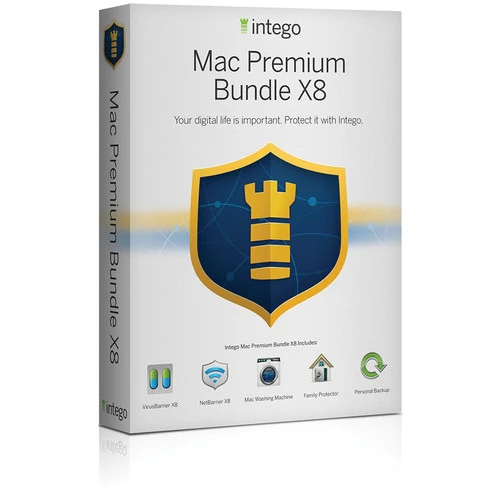
Intego Mac Premium Bundle was designed specifically for macOS, not adapted from a Windows platform. That makes a difference. It fits into your system without breaking things or flooding you with irrelevant features. You get real-time malware protection, network defense, and system cleanup tools. All built to run smoothly on Mac hardware.
One of Intego’s strengths is its smart firewall, which customizes security settings depending on whether you're connected to your home Wi-Fi, public hotspot, or office network. It also includes parental controls and backup scheduling that integrates directly with macOS.
Unlike some general antivirus programs that feel clunky on Mac, Intego keeps a low profile and doesn’t drain your battery or slow your workflow.
Best For:
- macOS users looking for software designed specifically for Apple systems
- Parents who want robust parental controls baked into their security suite
- MacBook users who value clean integration and performance consistency
Best Antivirus for Android Devices
Your phone holds more personal data than your laptop ever did: banking apps, passwords, emails, photos, the works. And Android, being open-source and widely used, is a favorite target for malicious apps and shady downloads. If you're not using mobile protection, you're basically leaving the front door wide open.
Kaspersky Mobile Antivirus
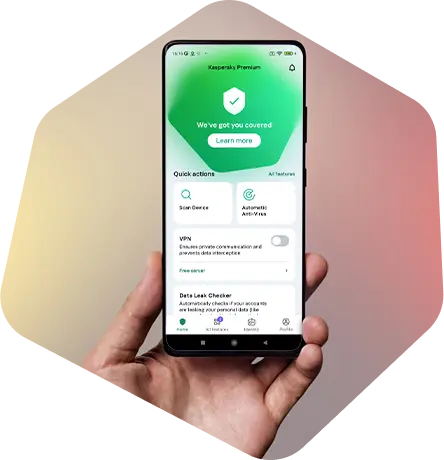
Kaspersky Mobile Antivirus delivers strong protection for Android users without turning your phone into a sluggish mess. It scans apps as you install them, blocks known threats before they do damage, and even includes anti-theft tools like remote wipe and device tracking if your phone goes missing.
The app runs quietly in the background and keeps an eye on suspicious behavior like apps trying to access your camera or location without a reason. It’s also smart about performance: no battery-draining bloat or constant notifications unless there’s something you actually need to act on.
You also get access to a basic password manager through Kaspersky’s larger ecosystem, which can be synced with desktop versions if you use the full suite.
Best For:
- Android users who sideload apps or spend time on public Wi-Fi
- Anyone who needs anti-theft features and lightweight security
- Users looking for cross-platform integration between phone and desktop
Best Lightweight Antivirus
Not every computer has the horsepower to run full security suites with all the bells and whistles. Older laptops, budget desktops, or systems already running resource-heavy software need protection that doesn’t drain CPU cycles or turn every scan into a waiting game. That’s where a minimalist but effective antivirus tool shines.
ESET NOD32 Antivirus
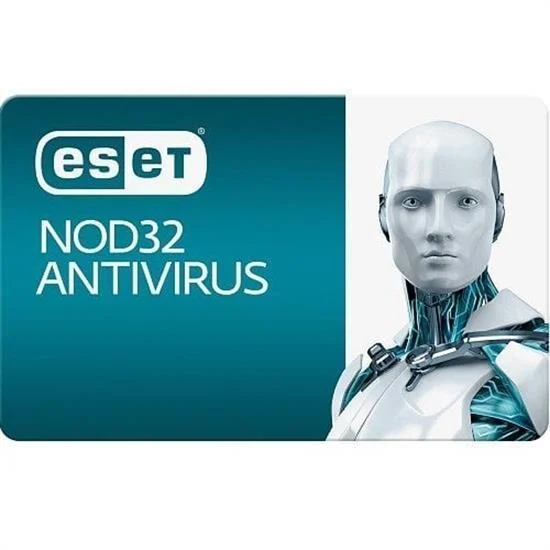
ESET NOD32 Antivirus is known for one thing: efficiency. It offers powerful malware protection while keeping its system footprint as small as possible. No flashy dashboards or unnecessary features just core protection that gets straight to the point.
Its real-time scanner is fast and thorough, flagging malware, ransomware, and even script-based attacks. What sets it apart is how quietly it runs. You won’t get overloaded with pop-ups or performance hits while gaming, editing video, or multitasking with demanding apps.
If you're tech-savvy and just want clean, effective antivirus without bloated extras like VPNs or browser extensions, ESET hits the sweet spot. And yes, it plays nicely with older hardware and lower RAM systems.
Best For:
- Users with older or lower-spec systems
- Gamers and creatives who need every bit of performance
- People who want powerful protection without constant notifications
Best Antivirus for Gamers
Gamers face a unique problem: balancing strong cybersecurity with system performance. The last thing you want mid-match is a background scan killing your frame rate or a pop-up blocking your kill shot. That’s why gaming-specific antivirus software needs to be smart, quiet, and invisible until you actually need it.
BullGuard Internet Security
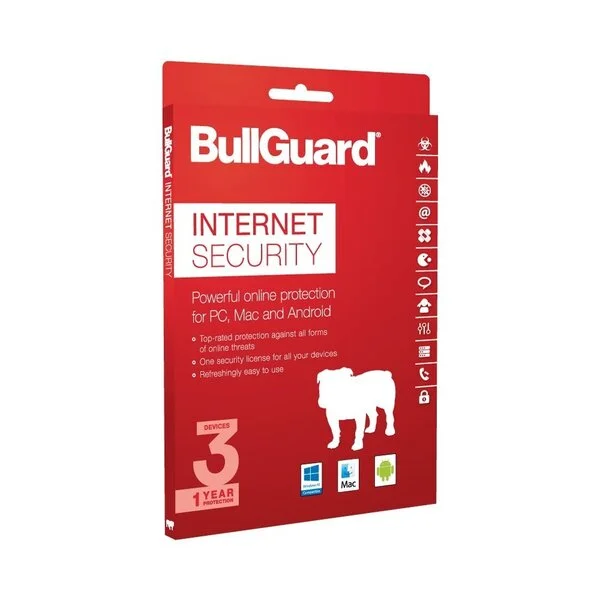
BullGuard Internet Security is one of the few antivirus platforms designed with gamers in mind. Its standout feature is “Game Booster,” which recognizes when you’re gaming and automatically reallocates system resources to prioritize your game. That means your antivirus protection stays active, but it won’t interfere with performance or slow you down during high-load moments.
Protection-wise, BullGuard still brings the heat. You get multi-layered defense against malware, ransomware, phishing, and zero-day threats. It also includes a secure browser, vulnerability scanner, and basic parental controls. While it doesn’t come with a VPN or integrated password manager, it handles real-time protection and background scanning better than most.
Best For:
- PC gamers who want protection without losing FPS
- Streamers and content creators who need smooth background performance
- Users who game frequently and don’t want to toggle security settings every time
Best Antivirus with VPN
When your antivirus doesn’t cover online privacy, you’re leaving a big hole in your digital defense. A VPN adds a critical layer especially if you’re using public Wi-Fi, streaming internationally, or just trying to keep your activity off the radar. If you’d rather not juggle two subscriptions, a bundled antivirus-VPN combo makes a lot of sense.
McAfee Total Protection
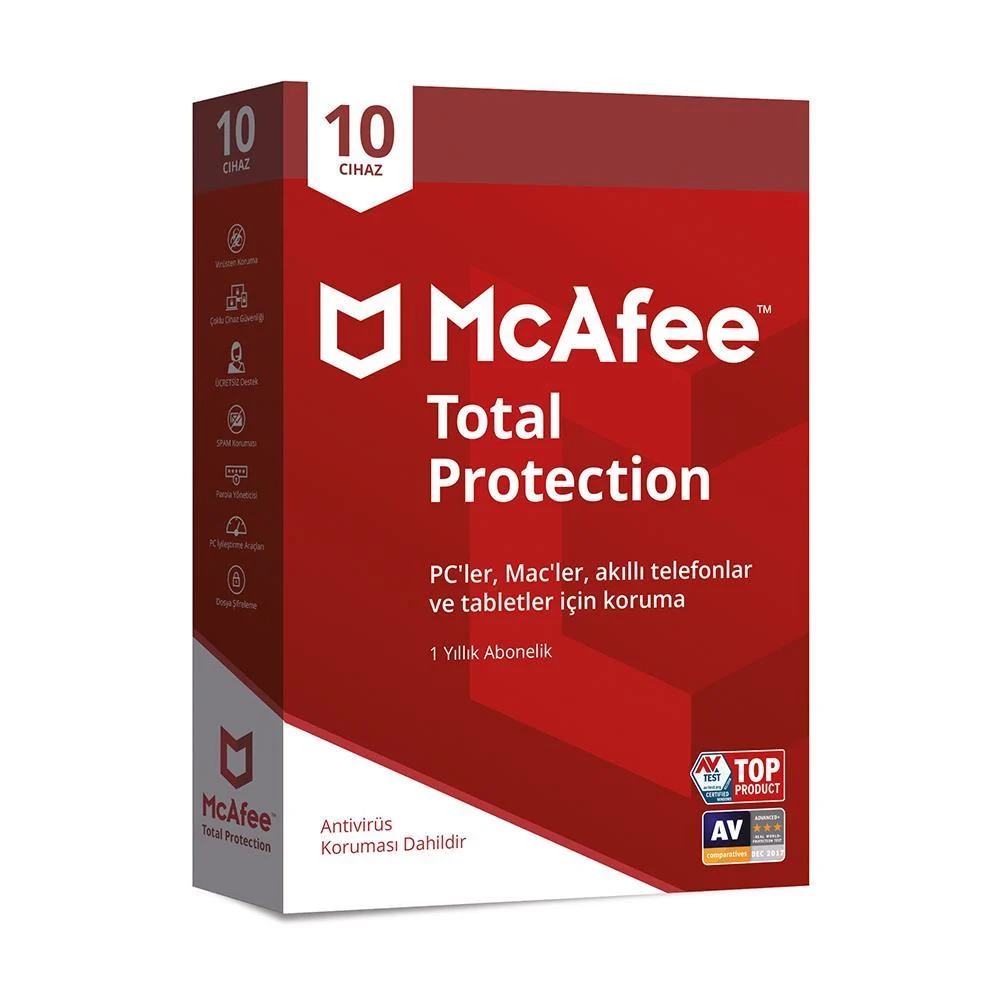
McAfee Total Protection brings strong virus and malware defense while also packing in a built-in VPN. That combo means you’re protected whether you’re downloading files, checking your bank account, or logging in from a coffee shop across town. The VPN kicks in automatically on unsecured networks, so you don’t have to remember to turn it on. It just works in the background.
Beyond the basics, McAfee also includes identity theft protection, encrypted storage, and a basic password manager that covers logins and alerts you if your credentials show up in known breaches. The interface is clean, easy to navigate, and ideal for users who want security that handles itself without constant tweaking.
Best For:
- Users who want antivirus and VPN in a single subscription
- Families or professionals who frequently use public Wi-Fi
- Anyone looking for identity and privacy protection without extra apps
What to Look for When Choosing Antivirus Software
Not every antivirus tool is created equal and flashy features don’t always translate to real-world protection. Whether you're using your device for work, gaming, or streaming, the right antivirus should work quietly in the background, not dominate your system or flood you with unnecessary alerts. So what should you actually be paying attention to when comparing options?
Real-Time Protection and Threat Detection
The heart of any antivirus program is its ability to detect threats before they do damage. Real-time scanning watches everything you open, download, or interact with and flags anything suspicious. But detection rates vary. Look for antivirus software that consistently scores high in independent testing from labs like AV-Test and AV-Comparatives. Extra points if it includes ransomware monitoring and behavioral detection for new or unknown threats.
You’ll also want something that scans emails and browser activity. Many modern attacks come disguised as regular content: a bad link, a fake invoice, a corrupted image file. Your antivirus should see those before you do.
Resource Usage, Device Limits, and Compatibility
You don’t need your antivirus dragging your system down. Especially if you're gaming, editing video, or working with large files, a resource-heavy program is a liability. Check reviews for CPU usage and background performance. Bonus if the software includes a “silent mode” or adjusts automatically when you're running high-load apps.
Also, think about how many devices you need to protect. Many paid antivirus tools now offer multi-device licenses covering Windows, macOS, iOS, and Android. If you're deep in one ecosystem or juggling a mix of phones, tablets, and desktops. Go with software that syncs and manages them all in one place.
FAQs About Antivirus Software
Even with so many antivirus programs out there, users still wrestle with the same core questions. How much is enough, which features really matter, and whether free protection actually holds up. Here’s a breakdown of common concerns, answered without fluff.
Do I need antivirus if I already have Windows Defender?
Windows Defender has improved a lot over the years, and for light users, it’s not bad. But it's still basic. It doesn’t always catch newer threats quickly, and it lacks advanced features like real-time behavioral analysis, password protection, and robust anti-phishing tools. If you’re doing anything beyond casual browsing, a dedicated antivirus gives you a much more solid safety net.
Can antivirus software slow down my computer?
Some can, especially older or free tools that haven’t been optimized. That’s why it’s important to choose antivirus software that balances protection with performance. Lightweight programs like ESET or those with built-in “game mode” settings help prevent slowdowns. Always check how a program handles background scanning and updates. Those are usually where performance drops show up.
Is free antivirus software safe enough?
For basic needs? Yes. If you're using a reputable provider like Avast or AVG. But keep in mind: free versions often skip extras like ransomware protection, identity theft monitoring, and secure browsing tools. They’re fine for simple setups, but if you're logging into banking apps or managing sensitive files, the paid features start to look like a smart upgrade.
What features are most important for mobile protection?
On mobile, malware isn’t the only risk. You also need tools that block unsafe links, scan apps before you install them, and let you locate or wipe your device if it’s lost. Some antivirus apps go a step further with anti-theft triggers, VPNs, and password leak detection. If you’re on Android, these extras are particularly valuable since the system allows sideloading from outside the Play Store.
How often should I run virus scans?
Most quality antivirus software runs background scans automatically, so you don’t need to initiate them manually. But it’s smart to schedule full scans once a week especially if you download frequently, install new software, or use shared USB drives. Quick scans can catch the obvious stuff, but full scans dig deeper and catch threats that may have slipped through.
Choosing the Best Antivirus Software for Your Needs
At the end of the day, the best antivirus software is the one that works for how you actually use your devices. That might mean a full-featured suite with built-in VPN and password manager if you're handling sensitive work files or switching between multiple platforms. Or it could be a lightweight, no-fuss antivirus that protects without slowing down your system.
What you don't want is to rely on default security and hope for the best. Threats are more complex now: malware, phishing, ransomware, tracking software and they hit faster than ever. Antivirus is no longer just about cleaning up infections. It's about prevention, identity protection, and making sure your digital life runs safely in the background.
Take stock of what you really need. If you work on public Wi-Fi a lot, prioritize something with a secure connection tool. If you're mostly a home user, look for strong real-time protection that doesn't bog down performance. And if you're running a mix of devices, find a solution that keeps everything connected under one subscription.
Security isn't just software, it's a habit. But picking the right tool to support that habit? That’s where it all starts.

